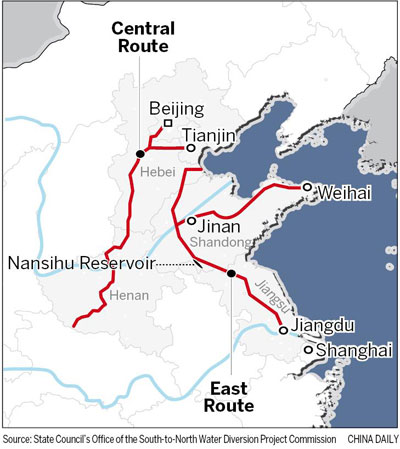Project will quench the thirst for parched northern part of country
Shandong province will get about 34 million cubic meters of clean water in the first use of the South-to-North Water Diversion Project's east route, authorities said.
The water diversion, which began on Nov 15, will end on Tuesday, according to the State Council's Office of the SNWD Project Commission.
The first phase of the east route, completed in March, brings water from the Yangtze River at Jiangsu province's Jiangdu to Shandong along the Beijing-Hangzhou Grand Canal.
The east route's first phase, which cost more than 50 billion yuan ($8.2 billion), is expected to supply up to 8.77 billion cu m of water to Jiangsu, Anhui and Shandong provinces every year, benefiting about 100 million people, the SNWD project office said.
"The amount of water supplied will be adjusted annually according to the shortages in those provinces as well as the inflow in the route's upper reaches," said an official with the SNWD project office who declined to give his name.
The world's largest water diversion program will move 44.8 billion cu m of water a year from the water-rich south via eastern, central and western routes to the arid north, including Beijing.
The annual water shortage in Shandong is 4 to 5 billion cu m, according to the provincial water resources department last year.
"The average per capita quantity of water in Shandong is about 322 cu m, less than a sixth of the quantity per capita in China," said Yang Jianwei, a Shandong official in charge of the project.
"The first phase of the eastern route will transfer an average of 1.35 billion cu m to the province a year, which will greatly quench its thirst," he said.
The diverted water will mainly satisfy the increasing demand of urban residents and industrial development, plus sectors like agriculture and navigation.
The water's price will be higher than local water sources, Yang said, without elaborating.
Since November 2012, tests have found water quality of the eastern route's trunk canals is at least Grade III, the minimum standard for drinking-water sources, according to the SNWD project office.
Real-time monitoring of water quality on the route has begun, the office said.
On Sunday, China's top leaders welcomed major progress at the South-to-North Water Diversion Project and called for further efforts to ensure the success of following construction work.
"We should strengthen management and keep working to ensure steady progress on the project and stable water quality," President Xi Jinping said.
Premier Li Keqiang and Vice-Premier Zhang Gaoli, also director of the project's construction committee, stressed the importance of the work, including ensuring water quality, protecting the environment and avoiding safety issues, to fully tap the project's economic and social benefits.
The first phase of the central route, scheduled to be finished this year, will supply water from the Danjiangkou Reservoir in Hubei province to northern cities, including Beijing, Tianjin, Shijiazhuang and Zhengzhou, beginning in 2014.
The western route, which will replenish the Yellow River with water diverted from the upper reaches of the Yangtze River, is still in the planning stage.
 Heavy cargo flights taking off
Heavy cargo flights taking off In pictures: PLA's digital equipment
In pictures: PLA's digital equipment  Americans mark Thanksgiving Day with parades
Americans mark Thanksgiving Day with parades Love searching stories in cities
Love searching stories in cities  Shanghai shrouded in heavy fog
Shanghai shrouded in heavy fog Office ladies receive ‘devil’ training in mud
Office ladies receive ‘devil’ training in mud China's first nude photographer
China's first nude photographer Selected sports photos of the week
Selected sports photos of the week Treasure of Chinese culture- Nuo Dance
Treasure of Chinese culture- Nuo Dance  Youths in Night club: photo story
Youths in Night club: photo story Models dazzle at Int'l Yacht Model Pageant
Models dazzle at Int'l Yacht Model Pageant  Crystal scenery in China: Jilin fog glaze
Crystal scenery in China: Jilin fog glaze  Tianjin holds first pole dance championship
Tianjin holds first pole dance championship  Annual Santa Claus parade held in Canada's Montreal
Annual Santa Claus parade held in Canada's Montreal China's aircraft carrier passes through Taiwan Strait
China's aircraft carrier passes through Taiwan StraitDay|Week|Month